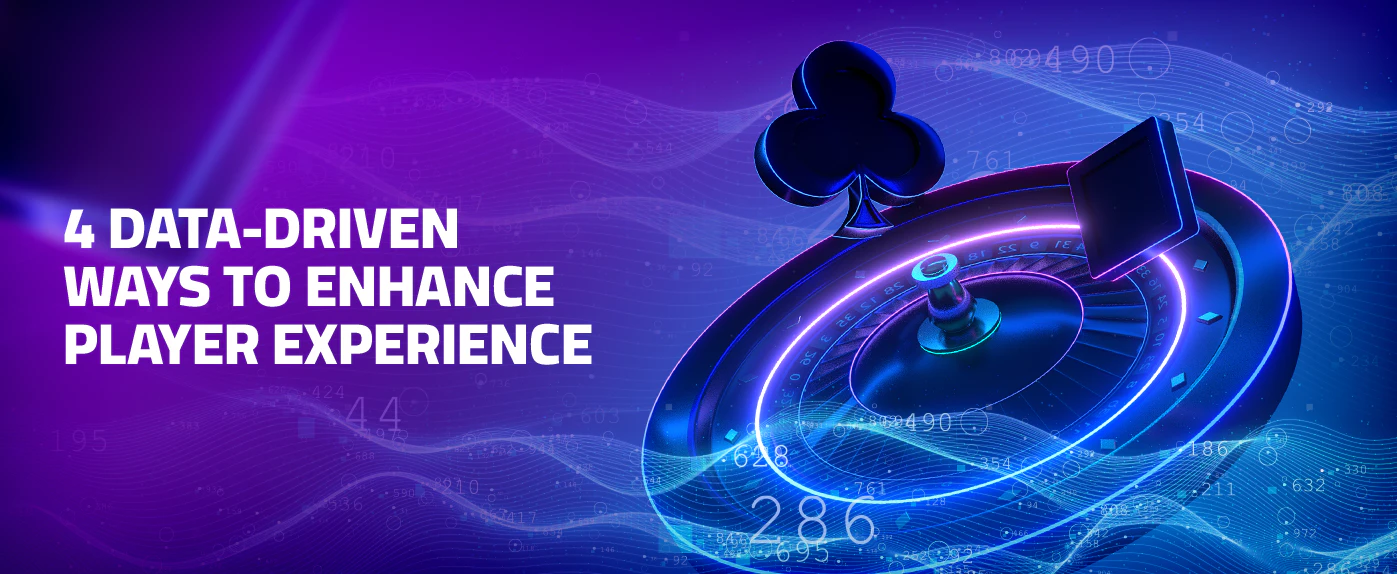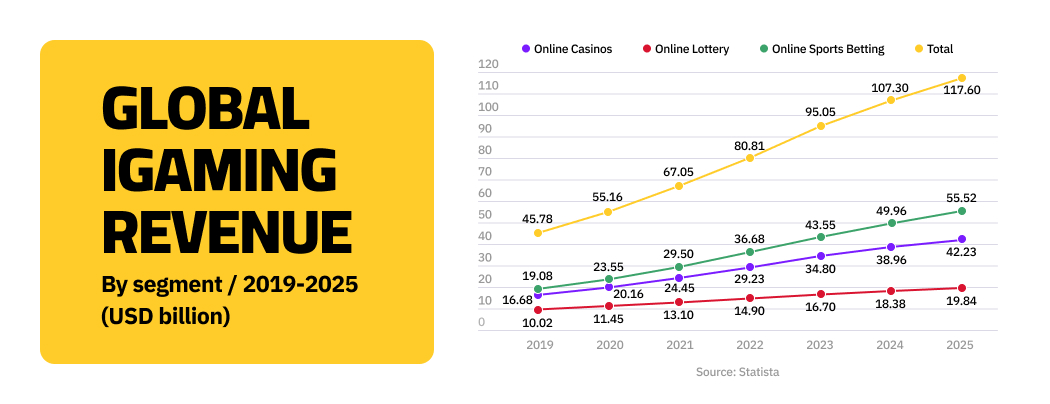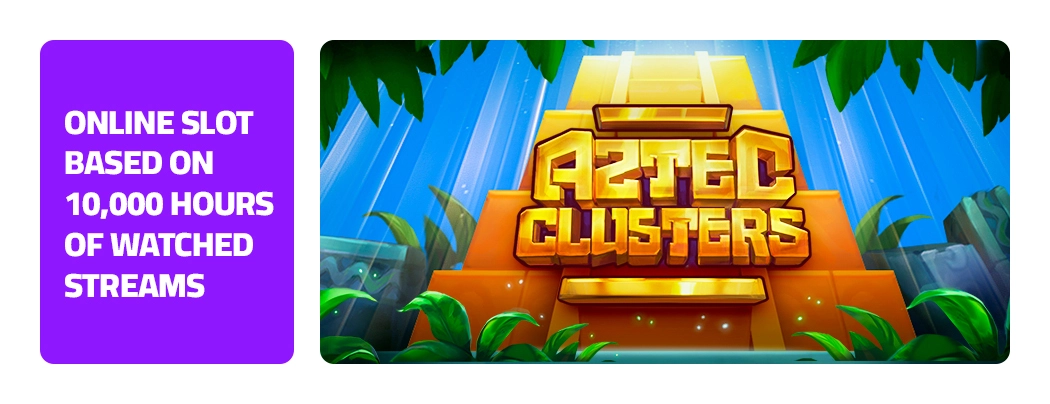
Data-driven era of iGaming: 4 ways to use game analytics for enhanced player experience
The iGaming industry has undergone a remarkable transformation in recent years, propelled by advancements in technology and changing consumer preferences.
Over the past four years, the industry has experienced an average annual growth rate of 20%, culminating in $95.05 billion in revenue in 2023. Looking ahead, Statista forecasts that the market will maintain its double-digit growth trajectory, projecting a market value of $117.6 billion by 2025.

With millions of players engaging in online gaming platforms daily, delivering a seamless and personalized experience has become paramount for operators seeking to gain a competitive edge. In this article, we explore how the strategic utilization of gaming analytics is revolutionizing the iGaming landscape, enabling operators to enhance customer experiences, drive engagement, and, ultimately, foster long-term loyalty.
Understanding the iGaming customer experience
A few years ago, success in online gaming was just about making transactions or bets. But today, smart operators know it’s more about connecting with players. People want games that work smoothly, are easy to navigate, and load quickly. They also want personalized recommendations to keep them interested.
So, keeping players delighted and coming back is crucial. With so many gaming options available, operators can’t take loyalty for granted. They need to focus on player satisfaction from the moment they sign up to when they’re playing regularly, using data to guide their decisions. That’s where gaming data analytics comes in. It helps operators understand what players want and how to keep them satisfied, ensuring long-term success in the ever-evolving world of online gaming.
What’s the power of big data in gaming industry?
In the dynamic world of iGaming, big data analytics is like a compass for operators trying to understand what players want and how they behave. It’s valuable because it can quickly look through tons of gamer data and find patterns affecting players’ actions.
For example, how players interact with the game can tell us how much they enjoy it. By checking their transactions, we can see how they spend money and their preferred payment methods. Plus, keeping an eye on gameplay data can give us clues about what kinds of games players like and how they play them. Studying these diverse sources provides operators with a comprehensive understanding of the user journey.
But using all this data can be challenging. It takes robust technology and skilled data analysts in the gaming industry to handle such vast amounts of information. To make the most of gaming analytics, operators need to build a culture in their company that values data. It means investing in technology, hiring experts, such as data analysts specialized in video games, and creating processes to make sure they’re using all the data effectively.
4 data-managed strategies to shape iGaming user experience
So, let’s explore how operators can leverage gaming analytics to drive business growth and success in the competitive iGaming world.
#1. Offering personalized game experiences and targeted marketing campaigns
Operators can enhance player experiences by offering customized titles, tailored recommendations, promotions, and bonuses. With advanced gaming data analytics techniques like customer segmentation and predictive modeling, they can understand player preferences better. It helps them create targeted marketing campaigns that appeal to specific audiences.
Whether it’s suggesting games based on past gameplay history or giving exclusive bonuses, personalized experiences boost player loyalty. Targeted marketing also helps operators use their resources wisely, focusing on the most valuable players. It leads to better conversion rates and improved ROI. Ultimately, it’s about making players feel valued and keeping them engaged in the gaming experience.
#2. Applying real-time decision-making and adaptive strategies
Operators stay agile and responsive in the gaming world by closely monitoring players’ behavior and market trends. Using game data analytics, they make quick, informed decisions to seize opportunities and tackle threats. Whether it’s adjusting game offerings to match players’ wants, targeting specific groups with marketing activities, or adapting to market changes, real-time video game analytics is their secret weapon. It’s all about staying ahead of the game and meeting the challenges of the iGaming world head-on.
#3. Detecting fraud and strengthening player security
Data analytics in gaming industry is also vital for stopping fraud. It helps businesses spot and prevent malicious activities like money laundering or hacking. By analyzing user transactions and account behavior, operators can find suspicious patterns that might mean fraud is happening. Gaming data analytics techniques like machine learning and anomaly detection make it possible to quickly catch fraud, reducing losses and keeping players and platforms safe. It builds trust and keeps the gaming community solid and secure.
#4. Enhancing gameplay and user interface
Using video games data analytics can make them even better. By studying player feedback and how people play the game, gaming industry data analyst can find ways to improve it. These insights help tweak the design, mechanics, or the game’s appearance to make it more captivating and enjoyable. It doesn’t only increase player satisfaction but also encourages longer gaming sessions and repeat play.
A case in point: how data analytics shapes player-centric online slots
As player-focused strategies gain traction in iGaming, operators and providers are taking note of gambling streamers. These influential figures are trusted by audiences seeking authentic gaming experiences. BGaming, a fast-growing online casino games provider, recognized this trend several years ago and initiated collaborations with streamers to showcase their games to a broader audience. By providing engaging content tailored to viewers’ interests, BGaming effectively expanded its reach and bolstered its presence in the competitive market.
To help track the success, BGaming partnered with Casinolytics, a live-streaming analytical AI platform. After compound research of data analytics games, the data reveals a compelling correlation: slot titles favored by streamers often rise to prominence in operator lobbies, underscoring the impactful connection between streamer preference and player engagement.
In February 2024, the companies collaborated to release an online slot called Aztec Clusters, which is totally based on data science games. This innovation draws upon comprehensive data, insights, and research obtained from extensive observation of streamers’ anticipation, frustration, and timing perception. With over 10,000 hours of watched streams, BGaming and Casinolytics have meticulously analyzed streamers’ reactions to various games and features, shaping Aztec Clusters into a genuinely data-driven creation.

Aztec Clusters sets a new standard in the market, offering gameplay and features to appeal to streamers and a diverse range of players. Its unique design, informed by extensive data analysis, positions it as a game poised to captivate audiences and redefine iGaming.
Final thought
In conclusion, big data analytics is one of the cornerstones of the iGaming industry. It gives operators valuable insights, improves how they interact with players, and drives business growth. With advanced games analytics tools, operators can understand player behavior better, leading to personalized gaming experiences, focused marketing, and improved gameplay. As the industry progresses, strategically integrating big data becomes more crucial for operators to stay competitive and thrive in this fast-changing market.





